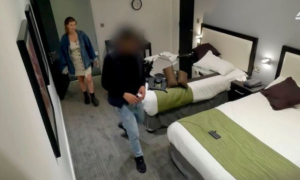 Last week Channel Four broadcast a remarkable investigative documentary, which has provoked a powerful reaction. “Undercover: Sexual Harassment – The Truth” presents us with an experiment. Ellie Flynn, an undercover journalist, goes out at night, pretending to be drunk and separated from her friends. With a feeling of dread, viewers watch what happens next.
Last week Channel Four broadcast a remarkable investigative documentary, which has provoked a powerful reaction. “Undercover: Sexual Harassment – The Truth” presents us with an experiment. Ellie Flynn, an undercover journalist, goes out at night, pretending to be drunk and separated from her friends. With a feeling of dread, viewers watch what happens next.
Of course, it was only going to be a matter of minutes before a man tried to pick her up. We then see him following her back into her hotel bedroom, demanding to have sex with her — despite her protestations. She then repeats the experiment. Exactly the same thing happens with another man — except that this time he also puts her hand on his groin. In other words, Ellie is first sexually harassed and then assaulted.
I imagine that many male viewers were shocked by the programme. I doubt that many female viewers were remotely surprised by the predictability of it all. But it doesn’t stop many of them being filled with resentments and flashbacks.
Along with every single one of my female friends, from very early on in my life, I’ve been flashed at, publicly groped, leered at – over and over. I count myself lucky that I was never raped, but it was sometimes a close-run thing.
The first time I remember a man exposing himself to me in public was when I was around seven. He smiled at me through his car window – I smiled back, and then saw that he was playing with his erect penis. I was too young to understand what an erection was — I didn’t really know what was going on as I didn’t have a clue about sex at that age — but what I did know was that something was wrong and it felt threatening. From then on, I was flashed at on a regular basis — always by much, much older men. They seemed to find my school uniform especially exciting.
As I got older and more aware of what was happening, I seethed. It was mostly the leering grins that were so upsetting and, in my teens and twenties, this happened on an almost daily basis. Sometimes, men would walk towards me in the street, undress me with their eyes and hiss at me, beckoning me as though I were a dog. I felt used, dirty and powerless and that made me so angry. But there was no point in reacting, as that got them even more excited.
My best friend’s older brother showed us pornographic photos when I was around ten. When I was about twelve, a man came up behind me in the park and he groped me. Another man walked up to me in a busy shop and squeezed my breasts – I shouted at him and he ran out, but no-one asked if I was OK. This all happened many years ago, but those experiences are imprinted on my memory, as clear as the day they happened.
I lived in Paris for a while and almost every night my friends and I were followed home. We took to carrying miniature tear gas canisters in our bags. We went on to study in Valencia for a couple of months. Every day, we’d steel ourselves before we walked out of the front door and look grimly ahead, trying to avoid those lecherous stares. Living in Paris and Valencia may sound like glamorous experiences, but they were ruined for us by harassment or worse.
And almost every woman I’ve spoken to about this has had similar encounters, also from a very young age. And it’s damaging for the soul. It makes us distrustful of men in general. Flynn says at one point: “Of course it’s not all men. The vast majority are good people. But I don’t know which one it is, which means I’m going to treat every one of them with caution.”
The other night, I was walking down a quiet street and a woman ahead of me looked back over her shoulder. I saw the fear in her eyes, followed by relief that I was a woman and so not a potential threat. I shouldn’t have been walking so closely behind her. I felt bad about that.
Of course, we all know that women try to stick to well-lit streets after dark, that they carry their keys, sometimes between the knuckles for self-defence, but also to get through their front door quickly. You don’t want to be fumbling about in your bag looking for your keys if there’s a dodgy looking man behind you. We all do this automatically – we are always on the alert. I wonder how many men realise to what extent this is the case.
And I haven’t even got to the “dick pics” sent to women on dating sites or their drinks being spiked in nightclubs, let alone being preyed on by a family member or a trusted family friend.
So, as a decent man, what can you do to help? A male friend of mine says that when he sees a woman approaching on a quiet dark street, he crosses the road so as not to make her feel threatened. And if he sees a woman walking ahead of him on that quiet dark street, he hangs right back. So often, men crowd us from behind, oblivious to how threatening that can feel, even in broad daylight.
And please don’t leer at us in the street – that is not a compliment. Nor is being catcalled or whistled at.
But going back to the programme, what was also shocking was that no-one, even in the likes of a crowded Leicester Square on a Saturday night, not even police officers, were looking out for that woman. It was all going on right under their noses and they did nothing. So, the lesson here must be for men to also be on the alert and be prepared to intervene, especially when it comes to a woman on her own at night, being followed, especially if she seems drunk and disorientated.
As Ellie Flynn says at the end of the programme: “When this is happening on the scale that it is, we need a huge cultural change that stops it happening in the first place. This is so often seen as a woman’s issue, but it’s everyone’s issue. And without everyone taking this on board, things aren’t going to change.”
